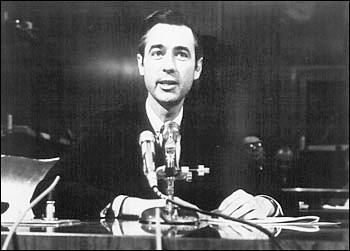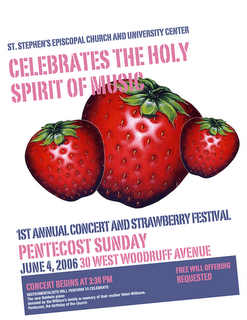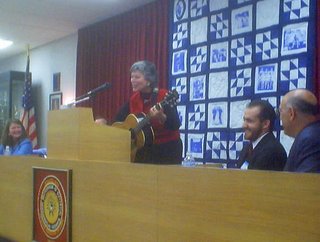
I first saw this video somewhere a couple days ago, and it was just linked again last night at Firedoglake.
Crooks and Liars has a great clip up from the Senate hearings in 1971 when Nixon wanted to cut the funding for the Corporation for Public Broadcasting in half and Fred Rogers made an impassioned plea that won over his listeners.The hearings were chaired by Senator John Pastore.
Pastore: All right, Rogers, you've got the floor.
Rogers: Senator Pastore, this is a philosophical statement and would take about ten minutes to read, so I'll not do that. One of the first things that a child learns in a healthy family is trust, and I trust what you have said that you will read this. It's very important to me. I care deeply about children.
Pastore: Will it make you happy if you read it?
Rogers: I'd just like to talk about it, if it's all right. My first children's program was on WQED fifteen years ago, and its budget was $30. Now, with the help of the Sears-Roebuck Foundation and National Educational Television, as well as all of the affiliated stations--each station pays to show our program. It's a unique kind of funding in educational television. Now our program has a budget of $6000.
It may sound like quite a difference, but $6000 pays for less than two minutes of cartoons. Two minutes of animated, what I sometimes say, bombardment. I'm very much concerned, as I know you are, about what's being delivered to our children in this country. And I've worked in the field of child development for six years now, trying to understand the inner needs of children. We deal with such things as the inner drama of childhood. We don't have to bop somebody over the head to make drama on the screen. We deal with such things as getting a haircut, or the feelings about brothers and sisters, and the kind of anger that arises in simple family situations. And we speak to it constructively.
Pastore: How long of a program is it?
Rogers: It's a half hour every day. Most channels schedule it in the noontime as well as in the evening. WETA here has scheduled it in the late afternoon.
Pastore: Could we get a copy of this so that we can see it? Maybe not today, but I'd like to see the program.
Rogers: I'd like very much for you to see it.
Pastore: I'd like to see the program itself, or any one of them.
Rogers: We made a hundred programs for EEN, the Eastern Eduational Network, and then when the money ran out, people in Boston and Pittsburgh and Chicago all came to the fore and said that we've *got* to have more of this neighborhood expression of care.
And this is what I give. I give an expression of care every day to each child, to help him realize that he *is* unique. I end the program by saying, "You've made this day a special day, by just your being you. There's no person in the whole world like you, and *I* like you, just the way you are." And I feel that if we in public television can only make it clear that feelings are mentionable *and* managable, we will have done a great service for mental health.
I think that it's much more dramatic that two men could be working out their feelings of anger--*much* more dramatic than showing something of gunfire. I'm *constantly* concerned about what our children are seeing, and for 15 years I have tried in this country and Canada, to present what I think is a *meaningful* expression of care.
Pastore: Do you narrate it?
Rogers: I'm the host, yes. And I do all the puppets and I write all the music, and I write all the scripts--
Pastore: Well, I'm supposed to be a pretty tough guy, and this is the first time I've had goosebumps for the last two days.
Rogers: Well, I'm grateful, not only for your goosebumps, but for your interest in our kind of communication. Could I tell you the words of one of the songs, which I feel is very important?
Pastore: Yes.
Rogers: This has to do with that good feeling of control which I feel that children need to know it's there. And it stars out,
What do you do with the mad that you feel--and that first line came straight from a child. I work with children with puppets in very personal communication in small groups
What do you do with the mad that you feel
When you feel so mad you could bite?
When the whole wide world seems oh, so wrong...
And nothing you do seems very right?
What do you do? Do you punch a bag?
Do you pound some clay or some dough?
Do you round up friends for a game of tag?
Or see how fast you go?
It's great to be able to stop
When you've planned a thing that's wrong,
And be able to do something else instead
And think this song:
I can stop when I want to
Can stop when I wish
I can stop, stop, stop any time.
And what a good feeling to feel like this
And know that the feeling is really mine.
Know that there's something deep inside
That helps us become what we can.
For a girl can be someday a lady
And a boy can be someday a man.
Pastore: I think it's wonderful. I think it's wonderful! (looking to his side) I think he's just earned the 20 million dollars! (Applause)
Alternate link for comments




